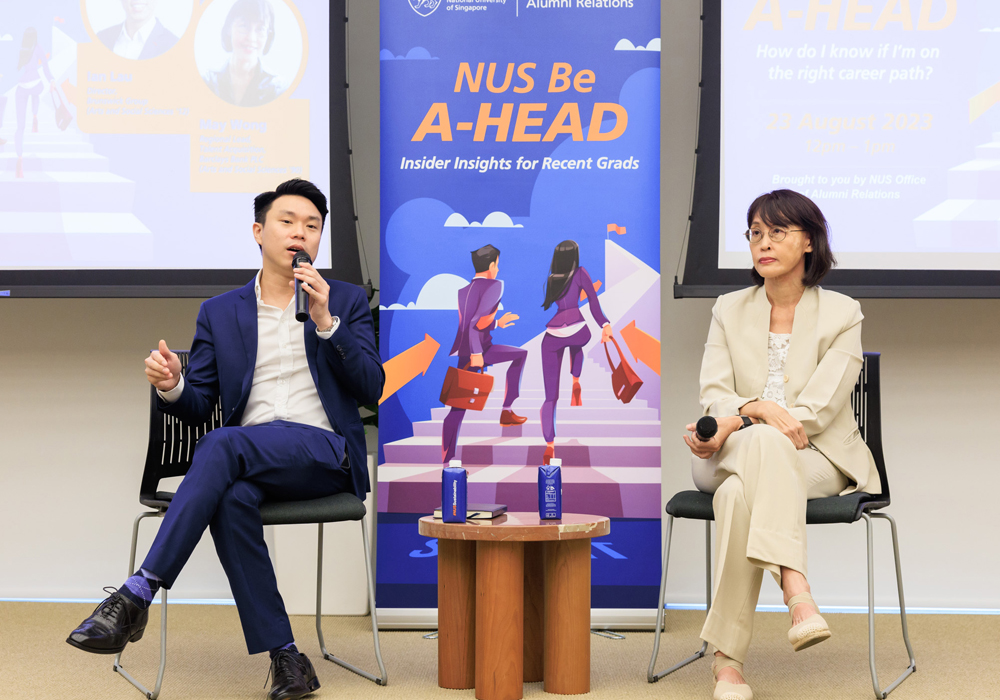Charting a Course into the Future
Plotting a career is never easy but Mr Ian Lau (Arts and Social Sciences ’12) has found his way into his dream job. He shares his journey as well as some ideas on how you
can do the same.
 Mr Lau captivated the audience by sharing his experiences.
Mr Lau captivated the audience by sharing his experiences.
“I didn’t know what I wanted to be,” says Mr Ian Lau candidly, when asked about his childhood dreams. Unlike some children who might have aspired to become doctors or astronauts, Mr Lau had no idea. And this is why he empathises with young adults who are trying to figure out their career paths. “We can’t always expect 18-year-olds to know what they want to do,” he says.'
The affable 35-year-old is currently a director at the Brunswick Group, a global advisory firm that specialises in offering companies focused guidance on critical issues — from capital markets to public affairs, social issues, crisis management and employee engagement. “I worked on the UBS acquisition of Credit Suisse and also advised on the IPO of Saudi Aramco,” Mr Lau says, describing some of his projects. “In the two months leading up to that IPO, I was regularly travelling to Saudi Arabia, and I was there when one of their oil fields was hit by a missile. We had to help them throughout that crisis.”
When talking to Mr Lau, what comes across strongly is how fulfilling he finds his work — it is dynamic and exciting, he meets people from all over the world, and no two days are ever the same. “I love my job,” he says. “I’m glad I’m able to make a difference in the world.”
 Speaking at the inaugural NUS Be A-HEAD career seminar on 23 August, Mr Ian Lau offered wise words for those seeking insights on professional growth.
Speaking at the inaugural NUS Be A-HEAD career seminar on 23 August, Mr Ian Lau offered wise words for those seeking insights on professional growth.
The path to the present
So how did a kid who had no clue end up in his dream job? “When I graduated, I had no job,” he recalls. “I knew what I didn’t want to do, but I didn’t know what I wanted to do.” He got his first role as a business banking manager at OCBC after meeting someone from the bank at a job fair and going for an interview. Although he was comfortable in the industry and liked his work, he soon realised that it wasn’t for him. “There is a very specific career path in banking,” he says. “But I somehow knew I wanted a different kind of journey.”
While studying at the National University of Singapore (NUS), Mr Lau completed two internships at a consultancy firm. The experience gave him enough knowledge and confidence to make an industry switch. He took up a position as associate director at WeR1 Consultants in January 2014. “The main reason I moved was that I felt I could pick up a lot of relevant lifelong skills in that job,” he says. “Specifically, it would give me a good understanding of capital markets, help me polish my writing and allow me to build my own network because I would be dealing directly with CEOs and company founders.”
3 tips for your career track

- Look at the big picture.
“Don’t be too focused on short-term gains, like a glamorous title or how much money you can earn, but think about how the job will benefit you in the long run.”
- Focus on building skills.
“There is a saying that it takes 10,000 hours of practice to gain mastery of a skill. It’s important to spend time honing your skill, whatever that might be.”
- Give every task your all.
“This could be a big or small thing. It can mean showing up, being present, asking the right questions, venturing outside your comfort zone or spending time networking when you would rather go home.”
He stayed for four years before he took the next step. “I wanted something on a bigger scale, but I didn’t know what that would be,” he says. He was headhunted for a job at Brunswick, and he went for the interview, even though he initially knew little about the company. “I saw it as an opportunity to train my interview skills,” he confesses. “But within five minutes, I knew that this job was everything I had been looking for. So I was really glad I took the chance and had prepared for it.”
![]()
When it comes to my career choices, I’m very calculated, never brash. I always think about the long term.
Mr Ian Lau
 Mr Lau, together with Ms May Wong (Arts and Social Sciences '90), Regional Lead, Talent Acquisition, Barclays Bank, speaking at the NUS Be A-HEAD career seminar.
Mr Lau, together with Ms May Wong (Arts and Social Sciences '90), Regional Lead, Talent Acquisition, Barclays Bank, speaking at the NUS Be A-HEAD career seminar.
Guiding principles
When asked about what has helped him steer his career through the years, Mr Lau talks about focus. “When it comes to my career choices, I’m very calculated, never brash,” he says, referencing his decisions in the past to accept a pay cut, extend his military service or quit a job. “I always think about the long term.”
Graduates today face challenges that never confronted their predecessors — a volatile, constantly changing landscape where technology has transformed everything. Working from home is now commonplace, but the pressure to work 24/7 is constant, while the rise of AI casts a looming shadow over many industries.
But rather than viewing AI as a threat, Mr Lau prefers to stay positive and look out for opportunities. “Rather than thinking of its impact in a negative manner, we can think of how AI might create positions for people,” Mr Lau says. “And those who are able to utilise AI quicker than their peers will be the ones to accelerate their careers.” He adds, “People need a global mindset as they enter the market today. And they have to be in tune with what’s happening in the world around them.”
Mr Lau may not have known what specific job to gun for when he was younger, but he has always known what he wants out of life. And he believes everyone does, too. “Whatever I did, I knew I wanted to carve a niche or build a brand for myself,” he says.
And when you discover what you want to do, passion takes over, as it did for Mr Lau. “When you love your work, it makes you genuinely curious,” he shares. “You want to understand the job’s different elements and the people involved. That’s when you can really fly.”
Mr Lau and Ms Wong spoke at the inaugural NUS Be A-HEAD career seminar on 23 August, which offered young alumni and graduating students career hacks, advice and tips.
If you are interested in attending future NUS Be A-HEAD seminars, please click here to check our programme calendar.
Text: Charmaine Chan